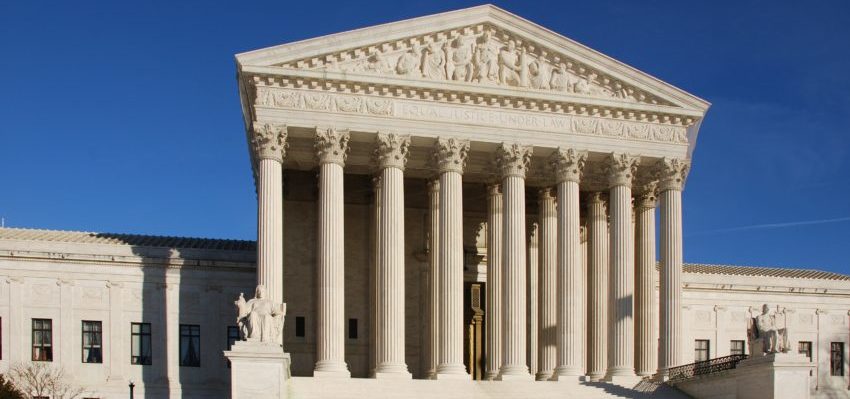
MacIver News Service | May 24, 2018
By M.D. Kittle
MADISON – Worker freedom could soon be coming to millions of public employees forced to pay union dues – including Wisconsin’s cops and firefighters who have missed out on previous right-to-work reforms in the Badger State.
Key worker freedom cases over the past six years have pointed to the downfall of the Supreme Court’s 1977 Abood decision.
The U.S. Supreme Court is expected in the coming weeks to issue a decision in Janus v. American Federation of State County and Municipal Employees. Observers on both sides of compulsory unionism are gearing up for a narrow 5-4 ruling overturning Abood v. Detroit Board of Education, which established that public sector workers could be forced to join a union or pay dues.
Key worker freedom cases over the past six years have pointed to the downfall of the 1977 labor case.
A victory for Mark Janus, the Illinois Department of Healthcare and Family Services employee who took on big labor for the right to choose, would be a win for public safety officers forced to pay union dues.
“You have this small group of workers who currently are the only people in the state of Wisconsin to be forced to join a labor union as a condition of their employment,” Patrick Semmens, vice president for Public Information at the National Right to Work Legal Defense Foundation, told MacIver News Service Wednesday on the Vicki McKenna Show, on NewsTalk 1130 WISN.
“A Janus decision, if it comes down in favor of Mark Janus, would give them that protection. It would say the First Amendment of the U.S Constitution says you can decide for yourself, do you want to fund a labor union or not?” Semmens added.
Janus is represented by the National Right to Work Foundation.
In 2011, the Republican-controlled Wisconsin State Legislature narrowly passed Act 10, Gov. Scott Walker’s bold reforms to the state’s public-sector collective bargaining laws that for so long compelled government employees to pay union dues – whether they supported the labor group’s ideas or not.
But the law exempted firefighters, state troopers and most police officers from the changes, including a provision that delivered right-to-work protections for the vast majority of public sector employees.
When Walker signed legislation in 2015 making Wisconsin the 25th right-to-work state in the nation, private sector employees were no longer bound by forced unionism but public safety officials – and a portion of their paychecks – remained shackled to their unions.
Law enforcement unions across the country have filed “friend of the court” briefs in the Janus case arguing that giving public workers the right to just say no to forced union dues would lead to a “death spiral” for law enforcement unions.
“Obviously everyone is paying attention to the non-right-to-work states where you’ve got millions and millions of workers forced, but there are workers in Wisconsin and Michigan and Kentucky and some other states (that), because of this public safety loophole to right-to-work protections, they can currently be forced,” Semmens said.
Law enforcement unions across the country have filed “friend of the court” briefs in the Janus case arguing that giving public workers the right to just say no to forced union dues would lead to a “death spiral” for law enforcement unions.
“When individuals begin to forgo their union membership, this problem continues to compound itself,” the National Fraternal Order of Police, the nation’s largest law enforcement union, insists in its brief. “Less members means the union must continue to make up the difference by imposing higher dues and providing reduced services… (O)nce union membership enters this tailspin, unions themselves may begin to fold.”
Big labor’s argument has long been that public employees who opt out of union membership still receive the full benefit of union-negotiated collective-bargaining agreements. Therefore, they should be made to pay at least a portion of the dues, so-called “fair share fees” that go toward worker representation.
But right-to-work proponents say labor groups continue to funnel union dues, including from workers forced to pay, into political campaigns and causes that some of their members don’t support.
Unions complain that they are the ones being compelled – forced to represent workers who decline paying union dues in right-to-work states. The U.S. Supreme Court, however, has repeatedly ruled that labor laws allow unions to negotiate contracts covering only dues-paying members. The problem comes down to exclusivity.
“Unions represent non-members only when they act as ‘exclusive bargaining representatives,’ which requires non-members to accept the union’s representation. In that case, the law requires unions to represent non-members fairly,” James Sherk, Research Fellow in Labor Policy at the Heritage Foundation wrote. “They cannot negotiate high wages for their supporters and the minimum wage for non-members. Unions can avoid representing non-members by disclaiming exclusive representative status.”
Big labor and the left-wing politicians it supports are right to be concerned. A ruling in favor of worker freedom would shut off the spigot of forced union dues.
Union membership has plummeted in the Badger State in the wake of the Act 10 and the right-to-work reforms led by Walker and the Republican-controlled Legislature.
The most recent data show union membership statewide declined from 354,882 members in 2010 to 218,233 in 2016, a decline of 38.5 percent.
A study by the labor-backed Illinois Economic Policy Institute projects more than 700,000 public-sector employees would leave their unions nationwide, about 8 percent of the government workforce, if worker freedom wins the day.